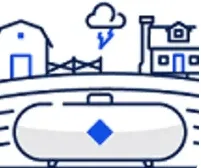Propane — sometimes known as liquefied petroleum gas, or LPG — is a gas normally compressed and stored as a liquid. It is nontoxic, colorless, and virtually odorless; an identifying odor is added so it can be detected. It is commonly used for space and water heating, for cooking, and as fuel for engine applications such as forklifts, farm irrigation engines, fleet vehicles, and buses. However, its applications are rapidly growing due to new technology developments. When used as vehicle fuel, propane is known as autogas.
Propane is primarily a byproduct of domestic natural gas processing, though some of it is produced from crude oil refinement. U.S. supplies are becoming increasingly abundant due in large part to increased supplies of natural gas.

Propane is an approved clean fuel listed in the 1990 Clean Air Act, and substituting it for other fuels such as gasoline and fuel oil is an economical and viable step toward cleaner air. This also reduces the greenhouse gas carbon dioxide and air pollutants like carbon monoxide and nitrogen oxide.

For millions of Americans every day, propane continues to deliver what is most important to customers choosing their energy: reliability. Even during extreme weather and natural disasters, it reliably heats and powers homes, businesses, and farms independent of the electric grid.

America produces more than enough propane to meet demand. In fact, the U.S. is its leading producer. Further, it is an abundant “bridge fuel,” making it a clean-burning alternative to gasoline and diesel that can address energy challenges while long-term renewable technologies are developed.

Despite sharp declines in oil prices, domestic propane production is expected to continue to grow rapidly, keeping downward pressure on average propane prices relative to oil prices.

Propane production keeps quality jobs in our country. As of 2018, over 97,000 workers across the U.S. are employed in propane trade, wholesale, and sales. If you’re looking for a job that takes you places and makes an impact for customers, learn more about joining the industry.
If you have any questions or concerns about any of our goods or services, please feel free to contact us.
Information provided by the Propane Education and Research Council